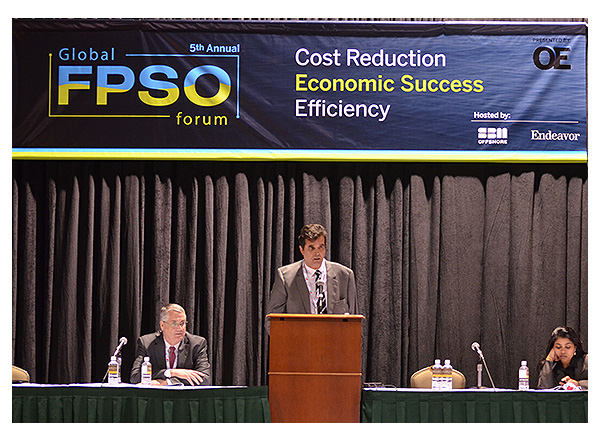According to ABS Chief Engineer, Offshore, Sidney Bereicoa, safety and asset integrity go hand in hand. This is the premise with which Bereicoa began his explanation to participants at the fifth annual Global FPSO Forum of why asset integrity is integral to safe operations.
Bereicoa addressed the subject of asset integrity as one of three presenters in the HSE panel on the final afternoon of the AtComedia-sponsored event held in Galveston, Texas. Building his case with the ABS mission as a foundation, he explained that property, life and the environment are the cornerstones of classification.
Where FPSOs are concerned, he said, the biggest physical considerations are, “structural integrity and stability, mooring integrity, mechanical integrity and process safety.” When considering worker safety, factors to be evaluated include fire protection, lifesaving equipment, accommodation and ergonomics and human factors. He concluded with an explanation of how sustainability of operations is as critical to environmental safety as managing water and air pollution.
In the course of his presentation, Bereicoa considered individual elements of structural safety in terms of the classification process, detailing each component and the ways in which surveys and analyses are performed to verify safety.
If operations are to be carried out safely, he said, “There needs to be an understanding of asset integrity as a life-cycle process executed through classification services.” He defined the progression of this process in terms of execution – beginning with design concept and moving through front-end engineering and design, detail design, construction, installation and operation, concluding with “late life,” which could include extended service if the FPSO is a candidate for life extension.
For those unfamiliar with the role classification societies play in verifying asset integrity, Bereicoa explained the value of independent technical assessment that reduces uncertainties and minimizes project risks. He pointed out that extensive experience with all types of assets translates into a practical approach that allows class societies like ABS to deliver rules and standards based on practical experience “from industry, by industry, to industry.”
In short, he said, asset integrity platforms and services offer a holistic, proactive, preventive maintenance scheme for assets and enable potential problem areas to be identified so proactive measures can be taken to remain in conformance with applicable requirements. Focused inspections and condition reporting on critical areas allow maintenance and inspection resources to be maximized and make it easier to develop repair specifications when repair and maintenance work are needed, he said.
“When asset owners engage class societies, they get much more than certification,” Bereicoa concluded. “They get an independent assessment of the integrity of their assets that translates into much greater overall value.”



































